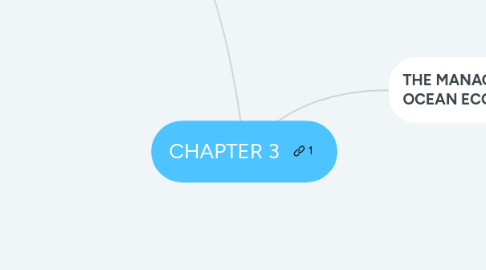
1. THE MANAGEMENT OF OCEAN ECOSYSTEM
1.1. The management ecosystem
1.1.1. Influencing political policy aimed at sustainable development
1.1.2. Protection of seas, oceans and coastal areas
1.1.3. General sustainabiliy concepts consists the ecosystem's integrity, economic efficiency and social equity
1.2. Biocenosis concept
1.2.1. Greek bios means life and koinosis means community
1.2.2. Group of interacting organisms that live in a particular habit and form an ecological community
1.2.3. Solar radiation can penetrate on average of 200m depth only through water column
1.3. Marine trophic (food) webs
1.3.1. The producers
1.3.2. The consumers
1.3.3. The decomposers
1.4. Main types of ecosystem concerned with ocean governance ecosystems
1.4.1. Deep-ocean
1.4.2. Coastal water
1.4.3. Marine-terrestrial
1.5. The ecosystem's properties
1.5.1. Productivity
1.5.2. Biodiversity
1.5.3. Resilience
1.5.4. Interconnectedness
1.5.5. Competition
1.6. Geographical scales of ocean ecosystem
1.6.1. Global
1.6.2. Meso regional
1.6.3. Regional
1.6.4. Local
1.7. Large marine ecosystem (LME) concept
1.7.1. A key tool in identifying ecosystems to which sustainable management systems might be applied
1.7.2. An area which has unique hydrographic attributes, submarine topography and a characteristics of a biological community structure
2. SUSTAINABLE MANAGEMENT CONCEPT
2.1. What is a sustainable management
2.1.1. Ecologically sound
2.1.2. Economically viable
2.1.3. Socially desirable
2.2. Three distinct ideas about sustainability are used today
2.2.1. Yield of a resource
2.2.2. Abundance and diversity of species
2.2.3. Economic and social development
2.3. Goal of the three pillars of sustainability
2.3.1. Environmental sustainability
2.3.2. Economic sustainability
2.3.3. Social sustainability
2.4. Examples of sustainable development practices
2.4.1. Solar and wind eneergy
2.4.2. Sustainable construction
2.4.3. Crop rotation
2.4.4. Water fixtures
2.5. Sustainable development for marine resources
2.5.1. Oceans, seas, islands and coastal areas form an integrated and essential component of the earth ecosystem
2.5.2. Critical for global food security and for sustaining economic prosperity and the well-being of many national economies, particularly in developing countries
